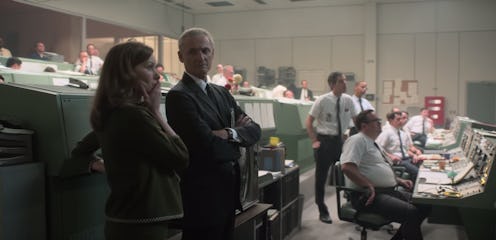Entertainment
Wernher Von Braun From 'For All Mankind' Has A Complicated, Controversial Real History
Though Apple's For All Mankind explores an alternate history in which the Russians beat the United States in the space race, there are still a number of historical figures featured in the story. Among them is Wernher von Braun, an aerospace engineer who led the first space program at NASA during the '60s. He's played by Colm Feore, who recently appeared in The Umbrella Academy as problematic patriarch Sir Reginald Hargreeves — an apt precursor for For All Mankind, considering von Braun is also rather controversial.
According to PBS, von Braun was born into a conservative, aristocratic family in Germany in 1912. He became obsessed with space travel as a teen, and began working as a rocket scientist for the German army in the 1930s, just around the time Hitler was rising to power. He eventually became a member of the Nazi Party and an SS officer, though, per NASA, he was arrested by the Gestapo in 1944 for careless remarks he made about the war. The rocket he was developing at the time — known as the V-2 — also largely relied on slave labor from a nearby concentration camp.
When World War II ended, von Braun and other members of his team surrendered to the U.S. They were brought to Texas as part of a CIA operation called Project Paperclip, where they continued to develop rockets for the U.S. government.
During that time, von Braun's work transitioned from missiles and weaponry to space flight. In 1955, he appeared in a series of Walt Disney television specials explaining how we would one day travel to space and land on the moon — which his team was integral in achieving. He helped to launch the first U.S. satellite, Explorer 1, in 1958. And in 1960, von Braun became the director of NASA's Marshall Space Flight Center, as well as the chief architect of the Saturn V launch vehicle that later carried the first men to the moon.
But Braun's Nazi background has, for obvious reasons, been a point of contention in the way his work is remembered. The satirist Tom Leher wrote a song about the so-called "apolitical" von Braun in the '60s, joking that, "Once the rockets are up, who cares where they come down? That's not my department,' says Wernher von Braun."
In 1976, von Braun was considered for a Presidential Medal of Freedom by the Ford administration. The idea was shot down by a White House aide named David Gergen, who, per The Boston Globe, simply wrote: "Sorry, but I can't support the idea of giving [the] medal of freedom to [a] former Nazi whose V-2 was fired into over 3,000 British and Belgian cities." Still, von Braun faced few real consequences in his career.
Popular culture varies in its portrayal of von Braun as hero or villain, morally corrupt or apolitical genius. He is said to be one of the historical figures who inspired the title character, a Nazi scientist, in Stanley Kubrik's Cold War satire Dr. Strangelove. Contrastly, Jake Gyllenhaal's character idolizes von Braun for his scientific achievements in the 1999 film October Sky, which is based on the childhood of future NASA engineer Homer Hickam Jr.
Which side of history von Braun falls on is ultimately up to interpretation, but keep all of this in mind as you watch For All Mankind, especially as it gives an alternate version of events. Perhaps his involvement in World War II will come with more significant fallout in the show.
This article was originally published on
